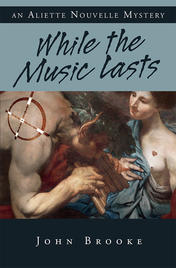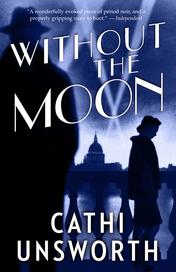Mystery & Detective

Ten years had passed since the tragedy -- a blow to the head that killed his lover, the actress Miriam Monette. He had been released the previous spring. It was on the evening broadcast; they’d caught a preview of that dull, fixed-forward stare. Legally, Luc Malarmé, former frontman and driving creative force behind Ma Malheureuse Pelouse, had paid his debt to society and was just another man faced with the long, slow task of rebuilding his life. But Luc was not just another man, and moral outrage is like an insidious weed. When a friend tried to help Luc get a leg up, the weed grew rampant. The friend was a theatre director in Montreal who was mounting a play and had created a role for Luc -- as an on-stage balladeer narrating the thread in song. The shrill reaction to this gesture made it more than a little ironic that it was a play about forgiveness.
Chief Inspector Aliette Nouvelle thought so. ‘Let the man get on with his life!’ she blustered.
Luc Malarmé was only a singer, after all. Perhaps he would sing a redemption song.
Magistrate Sergio Regarri thought Luc surely would, suggesting, ‘Who among us is above forgiving?’
In the world of French celebrity Miriam Monette had been the equivalent of royalty. Both her parents had enjoyed long and much-praised careers on stage and sceen. Miri was a princess. When news of Luc’s planned Canadian gig surfaced, her father led the righteous parade, declaring it a travesty that Luc Malarmé should sing again in public. How could he sing with Miri confined to the grave? It confirmed the man’s utter lack of remorse. Miri’s papa appeared on evening télé and said it plainly, ‘I detest him. I cannot forgive him.’ A legion of commentators fell loudly in behind. They said that for Luc Malarmé to sing again on stage would render his sin null and void. A politician in Canada who stood for family values intervened. Decreeing that all right-thinking Canadians agreed, the minister in charge of culture made sure Luc’s work visa was revoked.
Paris buzzed and snarked and roiled…
Watching from the south of France one warm evening in early autumn, a disgusted Aliette remarked, ‘How lucky for Canada to have such morally decisive leadership. Poor sheep.’
‘And couldn’t we use some here?’ Sergio replied, laconic, ironic, but not cynical.
Dear Sergio could not allow himself to be cynical and hope to do a decent job.
For a cop, it’s harder. Aliette supposed she could understand Miri’s aggrieved papa. And she had agreed with the feminist side of the debate the sad incident had sparked during the trial some ten years before. There may have been mitigating circumstances, but there was no excuse.
But the backlash of bitterness disappointed her. Nine years in prison is not nothing.
In November a popular Senegalese band invited Luc to come and sing with them.
Which incited yet more angst and accusation in the salons and studios of Paris.
Luc Malarmé had come down before Christmas, to his retreat on a ridge between Prades and Berlou. They’d started seeing him around town that winter. It was hard to miss that boyish face, the tousled hair that kept him looking barely over twenty even after nine years in a prison cell. He was indeed well practised in the art of gazing straight ahead. Luc Malarmé now existed in a netherworld of shame, permanently stained by his violent act. Most citizens of Saint-Brin stared but kept their distance as he unassumingly took his turn in line at the post office, the bank, the butcher’s, or at the Sunday market, that most public moment in the course of a week, when you saw everyone, at least in passing. They were curious to see such a man so close, and so ordinary. Aliette stared too. Impossible not to.
Others were more than curious. They were the ones who found him unforgivable.
It was the way they sized him up, openly judgmental, as if he were a melon past its prime.
There’s a cheap image for you -- a cheap image for a small, mean-minded sentiment.
But apt for a Sunday morning in early March. Aliette and Sergio were selecting tomatoes. Luc Malarmé was directly across the lane, at a fruit vendor’s, standing in a shaft of spring sunlight that had found its way through the covering of plane tree foliage. He was choosing a cantaloupe, appraising each piece of fruit with a touch once magical on a keyboard, a guitar string, working notes from his haunting flute. The Midi sun was truly warm that day and you might have thought that simple fact might be reflected in a fruit vendor’s eyes. But, no… Aliette watched the woman edging closer, peering, angry in advance, as if sure that Luc Malarmé would grab one of her wares and run, a pathetic petty thief. The sheer meanness in that woman’s face left the inspector boggled. ‘He looks so utterly alone,’ she murmured.
‘Everyone looks lonely when they’re shopping.’
Sergio’s off-the-cuff profundities were one of the many reasons Aliette had stayed with him for coming on three years. Today, purposely or otherwise, he’d missed her point. ‘I mean in the world. No one will go near him… How can that woman go to mass?’
‘She doesn’t. She comes here to sell her fruit.’
‘It’s a disgrace.’
‘Invite him for a drink. Take him out of pity.’
‘I’m sure he doesn’t want anyone’s pity.’
‘Everyone does, in their own way.’
Sergio got back to the business of selecting fare for their Sunday lunch. He chose another tomato and added it to the basket on the inspector’s arm. Then three more with quick resolve. Some radishes, lettuce, cucumbers. Aliette edged along beside her judge. Gawking? Luc Malarmé was more intriguing than her lover’s feel for fresh produce.
He was now bent over a crate of peaches, apparently oblivious to the resentment telegraphed from the fruit vendor’s damning eyes. But a veteran cop is hard-wired to the concept of intent and Aliette was deciding never to buy another piece of fruit from that awful woman when Sergio leaned close, advising, ‘You have to let people live their lives. He’ll sort it out. It’s not like he’s without resources.’
Of course he was not without resources. Luc Malarmé was rich. His band had been the biggest French music phenomenon since Johnny Hallyday. Nine years in jail and all the related legal costs would not come near to depleting that man’s stash of music industry gold.
‘But he’s starving for forgiveness,’ she countered.
‘Alors, what do you suggest?’
‘I don’t know… Do we not forgive the sinner who has paid the price?’ A question based on the words of our Saviour and hundreds of years of legal philosophy, not to mention her mother’s pithy admonishments that always went straight to her heart and stayed there.
Sergio shrugged -- he was only an Instructing Judge. He gently freed the basket from her arm and presented it to the vegetable vendor to be sorted, weighed and priced.
Aliette heard a voice behind her utter, sotto voce, ‘It’s wrong, so smug, to come walking back into the world like that, glorying in the fact of himself, like nothing happened. Poor Miri. If he weren’t so rich he’d be rotting in his jail cell. We’d not have to see this in our town!’
Where did these people get their ideas? How could anyone be smug after nine years inside?
And the hateful fruit vendor had no problem accepting his money…
Aliette watched him, bags in hand, head bowed, alone as he moved off through the market.
It was as if he had come to test them.


Prologue
Committal Proceedings, Cobourg Courthouse, September 21, 1853
Thaddeus Lewis was not in the least surprised that the courtroom was packed with spectators. The newspapers had been full of lurid details about the Paul Sherman murder, and the fact that the accused was a woman made the case even more sensational. As he elbowed his way to the front of the room, he couldn't help but overhear snatches of speculation and opinion. The circumstances surrounding the arrest of Ellen Howell had been thrashed over many times in the days leading up to the committal, but everyone seemed to expect that the prosecution would today present further evidence that was not yet common knowledge.
In Thaddeus's opinion, most of the people he pushed out of the way were gawkers and idlers,,there out of nothing more than curiosity.They would repeat the details of the proceedings later in the streets and taverns. Others would crowd around to hear news of the latest developments. Some of them would even pay for drinks in exchange for eyewitness accounts.
Thaddeus managed to find a seat in the second row of benches on the right hand side near the prisoner's box. Mrs. Howell had asked him to attend, "So I know for certain there's a friendly face in the crowd,"she'd said; but his presence would be no comfort if she couldn't see him. A beefy man and an elderly woman with a cane had glared as he shoved past them and slid into a vacant seat. Under any other circumstances, Thaddeus would stand back and let the woman take the space. Today, he would firmly claim possession of a few inches of bench.
The hubbub in the room grew louder as the prisoner was led in from a door at the side of the courtroom. She walked with her head down, looking neither left nor right, but just as she reached the box she stumbled slightly and reached out to steady herself, grabbing the rail in front of her. At that moment she happened to glance up. Thaddeus caught her eye and nodded. She smiled slightly.
The crowd quieted and everyone rose as the three grim-faced Justices of the Peace entered and took their places at the front of the room. Thaddeus rose only far enough to show the requisite respect. He wasn't taking a chance on losing his seat. When they had all settled themselves again, the clerk read out the charges, alleging that "Mrs. Ellen Howell did feloniously, willfully, and with malice aforethought, on the night of September fourteenth, in the Year of Our Lord eighteen hundred and fifty-three, in the Township of Hamilton, kill and murder Mr. Paul Sherman."
Mrs. Howell's head sunk lower as the accusation was read, and the audience in the courtroom was strangely silent as the gravity of the charge struck home. Newspaper reporters scribbled furiously, recording every detail so they could later describe it all for their readers.
One by one the prosecution witnesses were called and swore to tell the truth. The first to testify was the coroner, who had determined that the death was suspect and called together a jury who agreed. He described the scene when he arrived on Spook Island, and read the autopsy report stating that Paul Sherman had died from a gunshot wound to the chest.
The prosecutor thanked the coroner and then walked the other witnesses through their testimonies.
Donald Dafoe, the man who found the body, repeated his account that he had been fishing, and had put ashore on Spook Island to cook a pickerel, whereupon he discovered the dead man.
Two people testified that they had seen Ellen Howell on the shore with her husband earlier on the day in question. Two more swore that they had later seen her walking along the road from Sully in the direction of the Howell farm, although "she was ahead of us," one said, "and turned up the lane before we reached her." Both claimed she was wearing a blue dress. And one witness testified that Ellen Howell had previously attended a Methodist meeting wearing that same blue dress. He said he remembered it because his wife had remarked on it and had been badgering him for one just like it ever since.
The crowd became restless as the testimony proceeded. This was all old news. These details had been discussed and debated long since. They were hungry for something new to talk about.
The next witness was a man from Close Point who had rented his skiff to "an Englishman." He was a newcomer to the area, and did not know the man's name.
"And was this man alone?" the prosecutor asked.
"No," the witness replied. "There was a woman with him. A woman in a blue dress. She stood a little way away, so I didn't see her face."
"Nevertheless," the prosecutor continued, "can you say with any certainty that this same woman is in the courtroom today?"
"No, I can't be certain at all. She was about the same height and build as the woman in the prisoner's box, but she wore her bonnet low and I wasn't close enough to see her clearly."
Thaddeus thought the lack of positive identification was a point in Mrs. Howell's favour, but then he realized that all the testimony did was confirm that both the Howells were present when the skiff was hired.
It was Chief Constable Spencer who finally gave the spectators what they had come for. "I personally interviewed a number of the witnesses called today," he reported, "and there was ample evidence to warrant a visit to the Howell farm, just south of Sully. My intention was to interview both Mr. and Mrs. Howell."
"And what did they have to say for themselves, Mr. Spencer?"
"Mr. Howell said nothing. He was not present, being away, according to his wife, on business. Mrs. Howell claimed not to know Paul Sherman, and denied ever having set foot on Spook Island. We commenced a search of the premises and discovered a blue dress soaking in a washtub in the summer kitchen."
The prosecutor was on sure ground now. "And did this dress match the description of the blue dress as reported by the witnesses you interviewed?"
"It did. And on further examination, it was evident that its laundering had not been sufficient to remove a large stain on the skirt."
"And in your opinion, what was the cause of the stain?"
Thaddeus felt, rather than heard, the crowd's sudden intake of breath.
"It looked to me for all the world like blood."
A gasp, and then an eruption of comment from the crowd, as though this was proof of guilt indeed. The bailiff called for order and gradually the chatter died away.
The prosecutor thanked the witnesses, signalling that the presentation of evidence was at an end.
One of the justices turned to Mrs. Howell, asking if she cared to cross-examine any the witnesses. She didn't look up, only declined with a quick shake of her head.
The deliberation took little time. The clamour of the crowd was deafening when one of the justices announced that evidence in the case was sufficient to proceed.
Ellen Howell would be tried for murder.
Thaddeus remained in his seat, deep in thought, while the courtroom emptied. He would have to find some way to help her.





